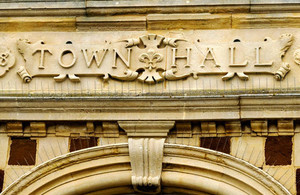Government to toughen rules banning sex offenders from councils
New disqualification rules to prevent people found guilty of serious crimes from serving as councillors and mayors.

town hall
Rules to prevent people found guilty of serious crimes from serving on local councils will be strengthened, Local Government Minister Rishi Sunak MP announced today (18 October 2018).
The new rules will mean any person who is subject to an Anti-Social Behaviour Injunction, a Criminal Behaviour Order, a Sexual Risk Order or who is on the Sex Offenders’ Register, will no longer be able to stand for elected office in their community.
Current conditions make clear that anyone convicted of an offence carrying a prison sentence of more than 3 months is banned from serving as a local councillor.
The new measures will strengthen this further by bringing disqualification rules in line with modern sentencing to include the alternatives to a prison sentence as a barrier to becoming a councillor.
These changes to the rules for who can stand for election, or hold a post as a councillor, will make sure those who represent their communities are accountable and held to the highest possible standards.
Local Government Minister Rishi Sunak MP said:
Elected members play a crucial role in town halls across the country, and are the foundations of local democracy. They are community champions, and have a leading role to play in building a better society for everyone.
With such an important role comes great responsibility, and these changes will protect residents while upholding the values and high standards of behaviour we all expect.
Anyone convicted of a serious offence that results in a sentence covered under the new disqualification criteria will be banned from standing for election, or would be forced to step down if they were convicted whilst in post.
The changes will better reflect rules governing standards of MPs, where members face suspension from the House for anything that contravenes the parliamentary code of conduct.
Futher information
Government will look to identify a suitable legislative opportunity to bring the changes into law. It will require changes to primary legislation, in particular the Local Government Act 1972, the Local Democracy, Economic Development and Construction Act 2009, and the Greater London Authority Act 2009.
Once the rules are implemented, councils across England will have the power to prevent individuals from standing as a councillor or mayor at the point they trigger the revised disqualification criteria. These proposals will not apply retrospectively.
This consultation was open to everyone between 18 September 2017 and 8 December 2017. We particularly sought the views of individual members of the public, prospective and current councillors and those bodies that represent the interests of local authorities and councillors at all levels.
A summary of consultation responses and the government response has been published today.
Office address and general enquiries
2 Marsham StreetLondon
SW1P 4DF
Contact form https://www.gov.uk/gui...
General enquiries: please use this number if you are a member of the public 030 3444 0000
If your enquiry is related to COVID-19 please check our guidance page first before you contact us - https://www.gov.uk/guidance/coronavirus-covid-19-guidance-for-local-government.
If you still need to contact us please use the contact form above to get in touch, because of coronavirus (COVID-19). If you send it by post it will not receive a reply within normal timescale.
Media enquiries
Email newsdesk@communities.gov.uk
Please use this number if you are a journalist wishing to speak to Press Office 0303 444 1209
Social media - MHCLG
Twitter - https://twitter.com/mhclg
Flickr - http://www.flickr.com/photos/mhclg
LinkedIn - http://www.linkedin.com/company/mhclg